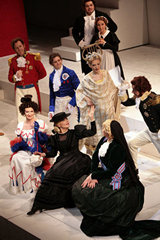| Opera Reviews | 10 May 2024 |
| Il
viaggio a Reims returns with less than stellar results by Silvia Luraghi |
|
| Rossini: Il viaggio a Reims Teatro all Scala, Milan 30 April 2009 |
|
|
The sets by Gae Aulenti featured large monitors which showed what was happening outside the hotel Giglio d'Oro, such as the coronation of the king. The stage was divided in two levels, with the upper one occupied by the thermal baths, where the guests of the hotel bathed in a row of bath tubs. The cembalo and forte piano players, James Vaughan and Beatrice Benzi, were placed on stage and were occasionally directly addressed by the singers, who moved off the stage on a gangway, entered the stage from the entrance of the theater, moved out of the parterre boxes, thus creating a sense of inclusion for the audience within the scenic space. Many members of the audience still had memories from the time of the production premiere, which was also the first revival of this opera in modern times. This was a pity, because, while the new cast could not compete with the original one, they certainly deserved to be judged on account of their performance and not only in comparison with other singers. Especially the women in the cast proved up to their task, at least vocally: Annick Massis as Countess Folleville displayed an agile and perfectly tuned voice, with an easy top which did not loose its color; Patrizia Ciofi as Corinna mastered the whole range without problems, Carmela Remigio lent her juicy soprano to Madama Cortese, while Daniela Barcellona tackled the role of Melibea with good results. Among the men in the cast, the best was tenor Jaun Gatell as Belfiore, whose shining, handsome tenor easily went up and down the range with no apparent effort. The others were in general on a slightly lower level: Alastair Miles was a rather dull Lord Sidney, bass Nicola Ulivieri as Don Profondo had a slightly limited size of voice and a too light color, Bruno Pratic̣ as baron Trombonok was far from memorable, while Fabio Capitanucci was more convincing as Don Alvaro. The real problem however did not lie with the voices, but in the theatrical side. All singers tried their best, but were generally unable to act convincingly in an opera which, having virtually no action, crucially relies on the singers' ability of attracting attention with their humor and their personality. In the pit, Ottavio Dantone, a conductor who is best known in the baroque repertoire, gave a brilliant reading of the score. A special mention goes to the solo flute player Davide Formisano, who played on stage in the first act. The performance was well received, albeit without special enthusiasm. |
|
| Text:
© Silvia Luraghi Photo: © Teatro alla Scala / Marco Brescia |

 La
Scala revived its renowned Luca Ronconi production of Gioacchino Rossini's
Il viaggio a Reims. At its original premiere at the Rossini Opera
Festival in Pesaro in 1984, the production was conducted by Claudio
Abbado with a stellar cast, which then toured to Milan in 1988.
La
Scala revived its renowned Luca Ronconi production of Gioacchino Rossini's
Il viaggio a Reims. At its original premiere at the Rossini Opera
Festival in Pesaro in 1984, the production was conducted by Claudio
Abbado with a stellar cast, which then toured to Milan in 1988. 





